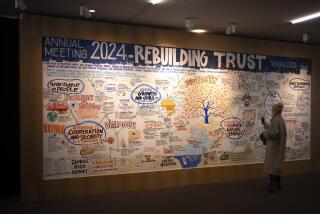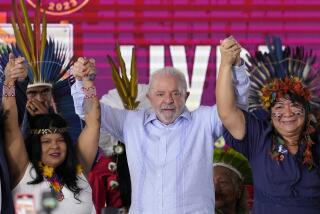For Democracy--With Benefits
- Share via
The WTO meeting and protests in Seattle suggest the need for a broadened public debate about economics and globalization, particularly with respect to the developing world. Such a debate should start by reexamining current ideas about democracy, markets, development and grass-roots activism.
* Democracy: Political systems based on electoral competition will be of limited value if they don’t produce at least some of the benefits that have been associated with democracy in the past: decent living standards; a say for ordinary people in how they are governed; freedom to organize in the workplace; possibilities for cultural expression. Democracies can function relatively smoothly for years without securing these benefits for the majority of people. U.S. foreign policy and international economic institutions such as the International Monetary Fund have relied on top-down conceptions of democracy and the rule of law, but have not looked at how people actually live.
What would it mean for the vast majority of people not only to vote but to exercise the rights of democratic citizens in their daily lives in neighborhoods, schools, workplaces and cultural activities?
* Markets: There is no evidence that free markets on their own promote well-being. Majorities of European and U.S. citizens came to lead secure middle-class lives when working people organized unions, political parties looked out for workers’ interests and governments acted to regulate business activity. Free markets in the developing world today are re-creating the vastly unequal economies of 100 years ago--boom and bust export cycles and dazzling prosperity alongside misery. The assembly plants that have burgeoned along the U.S.-Mexico border, for example, are being replicated in the interior of Mexico and throughout Central America. Their extraordinarily low wages and harmful working conditions indicate a likely path for the globalized future.
Instead of promoting this form of economic activity, U.S. and international policymakers and scholars should be asking, as many Latin Americans, Asians and Africans have been doing: “What makes a humane economy? What models of production and distribution might ensure decent standards of living?”* Development: Economic growth in the developing world has been a failure from the point of view of ordinary farmers, factory workers, street vendors and domestic servants, many of whom put in full days of work and go home to one-room shacks with bare light bulbs and no plumbing. It is time to acknowledge that there is something wrong with the concept of development itself. Development from what? To what? Can we imagine varied, creative mixtures of the pre-industrial and the industrial, the Indian and the “Western,” the village and the city? What alternatives have been overlooked, and how can new ones be forged?
* Innovation: Where do innovative cultural and economic practices emerge? Sometimes in national government offices or the conference rooms of global institutions. More often in the developing world it is in shantytowns, municipal governments, women’s groups and artistic and cultural programs that creative solutions are born.
It is to such local forms of innovation that we should look in formulating long-term goals for the global economy. Where are new democratic practices developing on the ground and solving the pressing problems of our age? How and when can these new possibilities work in tandem with reform-minded governments and organizations? Out of such thinking, international institutions and movements can forge an exciting, collaborative, open-ended vision for the future.
Not possible in the 21st century? Why not?
More to Read
Sign up for Essential California
The most important California stories and recommendations in your inbox every morning.
You may occasionally receive promotional content from the Los Angeles Times.













